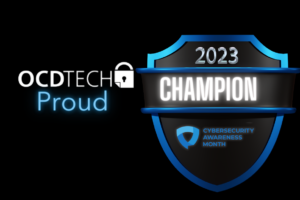Identity Management Day aims to inform about the dangers of casually or improperly managing and securing digital identities by raising awareness, sharing best practices, and inspire individuals and organizations to act. Join OCD Tech and Identity Defined Security Alliance on the journey to better identity management!
Do you get a little chill thinking about the dozens of login credentials you have set up throughout the wilderness of the internet? If so, don’t worry – you aren’t alone. Identity management, sometimes called identity and access management, increases in importance every year. That’s why we celebrate Identity Management Day!
Do you worry about the security of your personal data in our digital age?
Research by the IDSA reveals that 79% of organizations have experienced an identity-related security breach in the last two years, and 99% believe their identity-related breaches were preventable. According to the 2020 Verizon Data Breach Investigations Report, as many as 81% of hacking-related breaches leverage weak, stolen, or otherwise compromised passwords.
Identity management, though, is not just a concern for businesses and organizations. You can help protect your data by understanding and implementing some simple identity management practices.
You have the power to own and maintain your digital identity!
CONFIGURE YOUR SECURITY SETTINGS
Every time you sign up for a new account, download a new app, or get a new device, immediately configure the privacy and security settings to your comfort level. Check the settings on old accounts and delete any apps or accounts you no longer use.
DON’T TAKE THE BAIT
If you receive an enticing offer via email or text, don’t be so quick to click on the link. Instead, go directly to the company’s website to verify it is legitimate. If you’re unsure who an email is from—even if the details appear accurate—or if the email looks “phishy,” do not respond and do not click on any links or open any attachments found in that email as they may be infected with malware. Report phishing to your organization’s IT department or your email provider.
SHARE WITH CARE
Think before posting about yourself and others online, especially on social media. Consider what a post reveals, who might see it and how it might affect you or others. Personal information readily available online can be used by attackers to do a variety of things, including impersonation and guessing usernames and passwords.
SHIELD YOUR PASSWORD WITH MFA
Multi-factor authentication (MFA) will fortify your online accounts by enabling the strongest authentication tools available, such as biometrics or a unique one-time code sent to your phone or mobile device.
USE A PASSWORD MANAGER
Use password managers to generate and remember different, complex passwords for each of your accounts. While not a perfect solution, a password manager is currently the most secure way to send passwords and other login credentials to family members or coworkers. Duplicating passwords or using common passwords is a gift to hackers. If one account is compromised, a hacker will typically try the same username and password combination against other websites.
TURN ON AUTOMATIC UPDATES
Keep all software on internet connected devices – including personal computers, smartphones and tablets – current to reduce risk of infection from ransomware and malware. Configure your devices to automatically update or to notify you when an update is available. Software updates often fix security flaws. Outdated software can be riddled with security holes easily exploited by attackers.
Identity-related breaches are ubiquitous and preventable, whether you are an individual, a small business, a government agency or a Fortune 500 organization.
Source: https://www.idsalliance.org/event/identity-management-day-2023/




